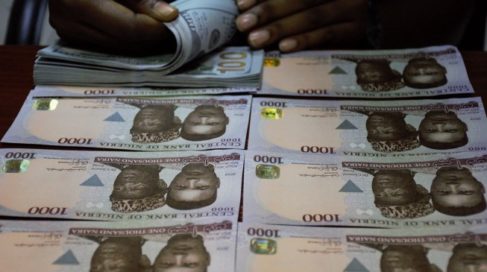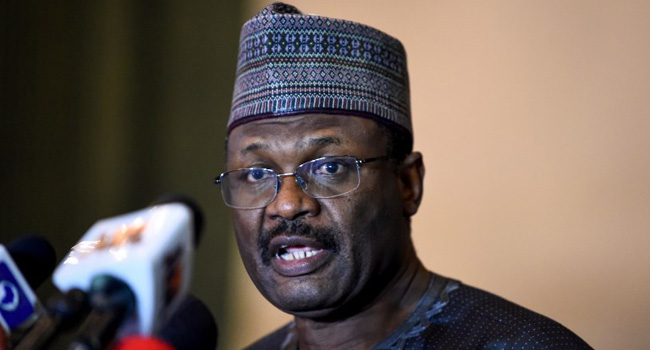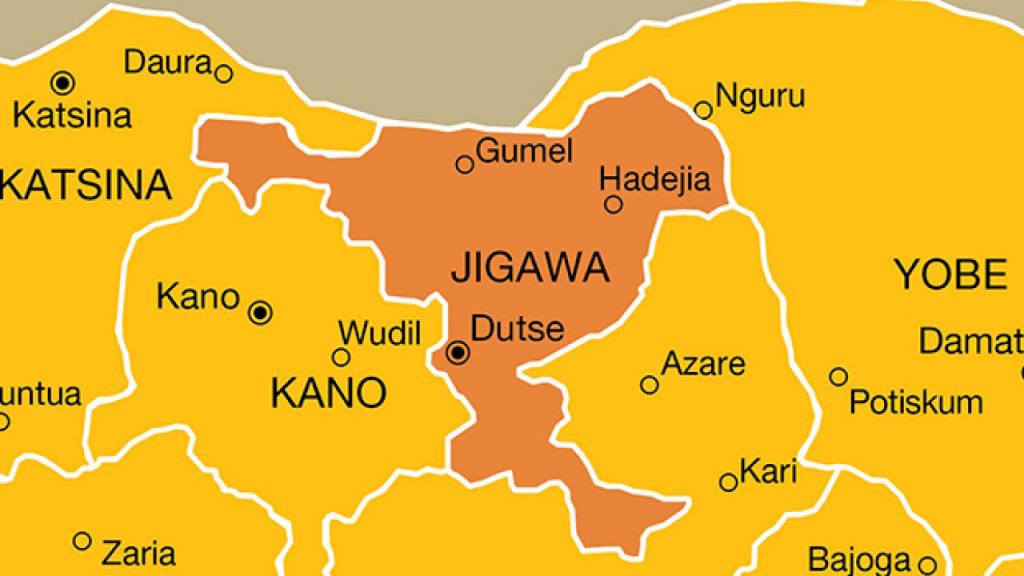The United Kingdom High Commission in Nigeria has said it will comply with all directives from the Federal Government, including the guidelines rolled out by the Nigerian Financial Intelligence Unit to curb money laundering and terrorism financing, which also applied to embassies.
The Director and Chief Executive Officer, NFIU, Modibbo Tukur, had on Thursday announced the prohibition of cash withdrawals from accounts belonging to the Federal Government, all its agencies, state and local governments with effect from March 1, 2023.
Tukur also said the policy applied to all foreign missions operating in Nigeria; accounts of all development partner institutions and the accounts of all instituted funds in the form of independent funds to be operated as mutual funds such as insurance funds, cooperative funds, brokerage funds, political party funds, or pressure group/union funds, once the funds were designated to exist as funds or to operate independently for management and/or investment.
He said, “The rate of withdrawals above the threshold from public accounts has been alarming, over N701bn has been withdrawn in cash from 2015 till date.
“The NFIU had told banks and government agencies at all levels to go fully digital by moving online, as all transactions involving public money must be routed through the banks for the purpose of accountability and transparency.
“This is not reversible as we are only enforcing the law. As far as we are concerned, Nigeria will become a full non-cash economy by March 1, 2023. As a consequence, any government official that withdraws even one naira cash from any public account from March 1 will be investigated and prosecuted in collaboration with relevant agencies like the EFCC, ICPC and the NPF.”
The NFIU noted that the enforcement, guidelines and policies were for the mitigation of money laundering, terrorism financing, and proliferation of weapons, and prevention of predicate crimes.
Responding to inquiries from one of our correspondents, the UK High Commission’s spokesman, Dean Hurlock, said, “I’m not aware (of the NFIU guidelines), but I’m sure the right team is. We will of course comply with all Federal Government directives.”
The missions of the United States, Canada and China have yet to respond to emails asking if they would comply with the NFIU guidelines as of the time of filing this report.
Some former diplomats have, however, faulted the directive, stating that the agency has no authority over foreign diplomatic missions in the country.
The foreign policy experts, who spoke in separate interviews with our correspondents on Friday, wondered how the NFIU would compel the missions to comply with its directive considering that they represented their home governments, aside the fact that they had diplomatic immunity.
But speaking to Sunday PUNCH, a former Nigerian Ambassador to Mexico, Ogbole Amedu-Ode, said the NFIU policy was subject to local regulations only
Amedu-Ode explained, “First of all, what is the law establishing NFIU and what latitude, in terms of legal enforcement of rules and regulations, do they have? And if they have such rules, do they cover diplomatic missions operating in Nigeria?
“Of course, the person and the premise of a diplomatic agent are invaluable and I want to stress that it (directive) covers their bank accounts and all that, but it is subject to local regulations.
“Can they categorise accounts belonging to foreign diplomatic missions and accounts belonging to Nigeria public institutions? However, does the NFIU have the legal authority to monitor what is going on in diplomatic missions and their bank accounts in Nigeria?”
In the same vein, retired Ambassador Rasheed Akinkuolie said foreign missions could not be restrained, noting that diplomatic immunity for diplomats and missions was a mutually agreed convention.
Akinkuolie stated, “Diplomatic missions in Nigeria fall under ‘Exceptions to the Guidelines’ in the NFIU cash withdrawal policy. Foreign missions cannot be restrained in any way in their legitimate activities in a host country, including their financial transactions.
“If there is insistence on applying the stringent regulations by the Nigerian government, the same restrictions will be placed on all Nigerian diplomatic missions abroad. Diplomatic immunity for diplomats and missions is a mutually agreed convention, which countries are careful not to violate because of the consequences.”
Corroborating the ex-diplomats, a former Nigerian Ambassador to Angola, Folorunsho Otukoya, noted that embassy accounts were not regarded as local, making it impossible for the NFIU policy to be enforced on the missions.
Otukoya noted, “Whatever the specifics of the guidelines may contain, embassy accounts are not regarded as local. Since remittances come into them directly from their sending states, it may be difficult to strictly impose those guidelines to the letter.
“From my experience in other lands, central banks have often prevented embassies from paying local currencies into their accounts once they withdraw the forex equivalent. This is to prevent what we call ‘double tripping’.
“It is to prevent missions from taking out forex and going to the black market and coming back to deposit into their accounts to do local expenses. It’s an elaborate system but most missions still find ways of circumventing those provisions.”
However, an ex-Nigerian Ambassador to Algeria, Ambassador Mohammed Mabdul, said as long as foreign missions were operating in a country, the law of the current country would apply to them and was in line with international best practices.
According to him, the policy on money laundering applies to all foreign missions in Nigeria, stressing that the policy was being enforced in most countries.
Mabdul, who retired from the Foreign Service last year after his tenure in Algeria, argued, “Even though the foreign embassies represent their home countries, the moment they are posted to another country, they are governed by the laws of the country. That is the standard procedure, especially when such laws do not contravene international best practices.
“There are certain financial regulations that are practised, not only in the local banks, but by all the banks around the world. Most financial institutions operate to protect transactions of money in a legal way and to avoid illegal activity, which includes money laundering and misappropriation of funds. These policies are being regulated in most countries. It is some developing countries that are relaxed in enforcing such a policy.”
A Senior Advocate of Nigeria, Peter Anababa, faulted the exemption in the guidelines, which required agencies that needed cash to apply for a presidential waiver.
He also observed that poor infrastructure could affect the cashless programme, stating that the nation did not have a robust technological infrastructure to leap-frog the initiative.
Speaking on Channels TV Sunrise programme on Friday, the senior lawyer said, “I want us to look at the provision that all withdrawals will have to be approved by the President. In that regard, do you anticipate bureaucracy setting in at that point? How many approvals can the President sign in a day or in a week? Honestly, I don’t know how the President will cope with it.
“Apart from bureaucracy, it becomes another weapon for political corruption, because before you can see the President, it’s like going through the eye of the needle. So, if you have a need, how do you get to see Mr President?
“Another disadvantage is: are we sufficiently mature in terms of technology for cashless policy? Even for most of us who are in town, do we even have Internet facilities even within the banking system in Abuja, for instance, and some other cities? Each time you go to your bank, you are told that the network is down. How has the government set up the facilities to meet these needs? Because, the other climes we are trying to copy from, the Internet works 24/7; the Internet facilities are superb and there is no power outage.
“Are we going to fix solar panels in the villages? How many banks do we have in the villages? Are the villages not going to use money to do business? These are the disadvantages that I see, but on the basis of if the intention is correct, I will support it. The disadvantages outweigh the advantages.’’
Faulting the anti-corruption campaign in the country, Anababa wondered why banks and other financial institutions had not been prosecuted for enabling humongous graft.
He stated, “Some of these banks are violating the laws of Nigeria with such impunity that if I were to be in a position of authority, their banking licences would have been withdrawn by now.
“But even when there are court orders, some of these banks circumvent them to bring down the economy of Nigeria or to undermine the authority of the court. Today, the kind of corruption going on in our banks is so humongous and so mind-boggling that it will take a man that is nationalistic to tackle it because heads need to roll.”
In his comment, Jibrin Okutepa, SAN, also contended that the NFIU had no powers to stop states from withdrawing cash, noting that the agency should not have issued the directive.
Stating that he had read the law setting up the NFIU, the SAN averred that no law gave it the powers to regulate cash withdrawals.
He said, “So let’s not run on sentiment. I don’t think that the NFIU has the power to stop a state government from withdrawing cash. Even though the Act states so, it will be running against the constitution. The point I’m making is you can begin to come to reality.
“The NFIU ought not to have made that statement. It could have possibly been a joint statement but beyond that; you want to go cashless, does NFIU guarantee that the financial system can guarantee a total cashless society by March 1? Now, I could have expected that the CBN and other financial institutions would be part of a coalition that will bring this to pass.
“My major response is that they cannot go outside the law setting them up. I have read that law, it doesn’t give them powers to regulate cash withdrawals of the state and I have also asked you….who have they prosecuted all these while?”
ALGON backs policy
Meanwhile, the Association of Local Governments of Nigeria has commended the NFIU for prohibiting cash withdrawals from the accounts of the three tiers of government.
The association said the policy, if adequately enforced, would reduce corruption by about 50 per cent.
The Secretary, ALGON Board of Trustees, Chukwudi Ezinwa, told Sunday PUNCH that prohibiting withdrawal of cash from government accounts would drive development in the country.
According to him, the new policy is a welcome development that will help to check spending of public funds.
He said, “What the NFIU has done is a welcome development as far as I am concerned. This is so because any money in the account of local governments is supposed to be used for the purpose it’s meant for.
“No level of government should deal with cash, especially now that we are talking of going cashless. Think of it, if the government doesn’t pay salaries in cash, I don’t see why its other expenditures should be done in cash.
“It will be beneficial to the development of this country because funds will now be used for what they are provided for.”
Ezinwa added, “When a local government chairman or state governor says they have spent a particular amount on a project, they would have paid the contractor through an account and not cash. If anything happens along the line, the fund will be traced to the contractor, who received the payment. And if he is unable to present the project, then he will have to refund the money to the account.
“Through this, people will not be able to steal public funds through the withdrawal of cash. The only lapse is that it will not check when a project has been over-estimated. But definitely, the project can have its value.
“It will be different from when you say N40m was disbursed to a particular state or local government and you cannot trace it anywhere. Now, you will have to see the project and since payment has now been mandated to be made through transfer, it will be traceable to someone.
“Through this, corruption will be reduced by 50 per cent. We have started getting it right now. Because if any government agency says it will transfer money to your account, you will know that your account is in trouble and that you have to be very careful, because it will be monitored.”
States react
The Bayelsa State Attorney-General and Commissioner for Justice, Biriyai Dambo, SAN, expressed personal reservations about the guidelines issued by the NFIU.
He argued that the constitutionality of the guidelines would be challenged in court because Nigeria was not a unitary state, but a federation made up of various states with three arms of government.
Dambo said, “Nigeria does not operate a unitary system of government. Nigeria is a federation made up of sub-nationals (states) that have various organs of government made up of the executive, legislature and judicial arms.
“The legislature appropriates so I don’t see the constitutionality in the said guidelines the NFIU intends issuing to be operative by the 1st of March.
“It will definitely be challenged in court. This is my personal view and not the position of the state (government) yet.”
The Kano State Government, on its part, stated that it would comply with the directive only if it was backed by an extant law.
The state Attorney-General and Commissioner for Justice, M. A. Lawan, stated that the state government as a law-abiding entity, would comply with the directive as long as it is backed by law, which must be binding on all states of the federation.
According to him, the directive has been overtaken by events following the recent introduction of cash withdrawal limits by the Central Bank of Nigeria.
The Commissioner for Finance, Budget and Development in Adamawa State, Dr Ishaya Dabari, said the state government would wait for the NFIU cashless policy to be ratified by Federation Accounts and Allocation Committee as well as National Economic Council.
He noted that states were expected to comply with the directive being a policy coming from a competent regulatory agency of the government.
On its part, the Kogi State Commissioner for Finance, Ashiru Idris, said the state government would comply with the directive.
However, the Ondo State Government said the issue of currency was the exclusive responsibility of the Federal Government.
The state Attorney-General and Commissioner for Justice, Mr Charles Titiloye, said the states had nothing to do with the issue of currency.
The Special Adviser to the Gombe State Governor on Information Management and Strategy, Ahmed Gara-Gombe, said the state had achieved fiscal responsibility, which was the desire of the NFIU.
According to Gara-Gombe, any Federal Government policy position that does not breach the rights of a state under the constitution will be supported.
“The NFIU position is all about fiscal responsibility and in Gombe State, we are in the top three in Nigeria if not number one. Recently, the Chairman of the Revenue Mobilisation Allocation and Fiscal Commission commended the governor of Gombe for being one of the most fiscally responsible in governance and management of public resources,” he stated.
PUNCH







